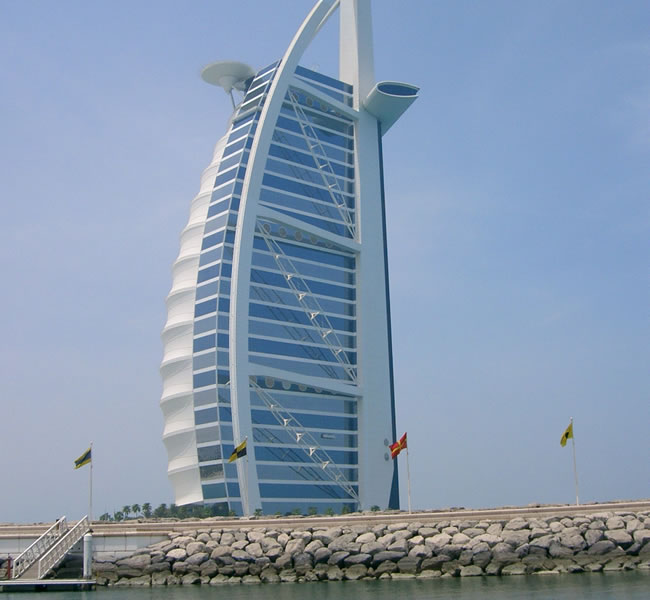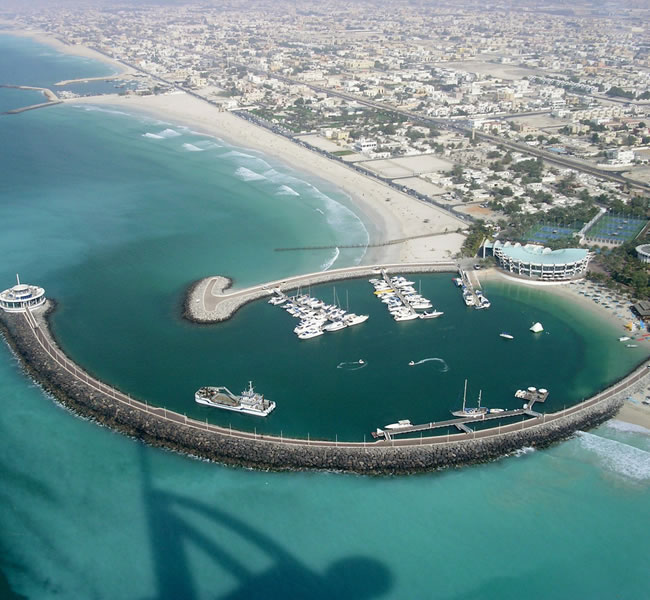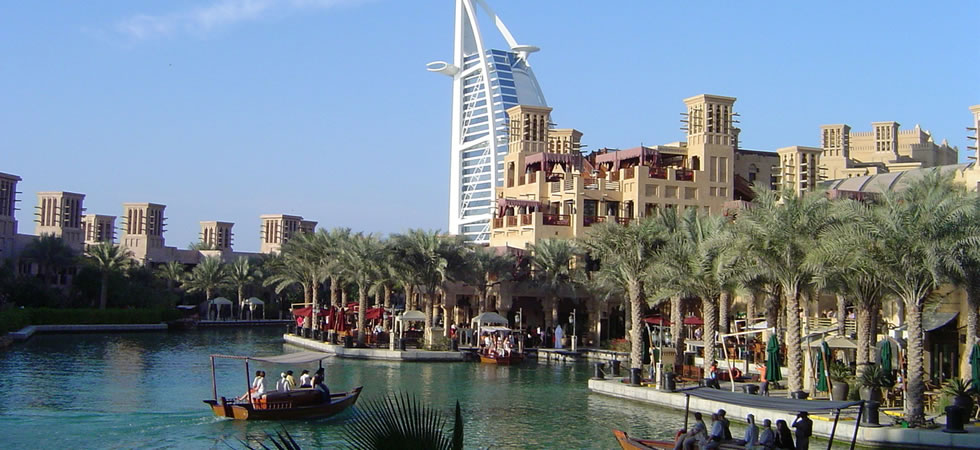Dubai has transformed itself from a desert to a metropolis in decades. Luxury travel writer Mark Southern finds out if it’s the real thing or just a hazy facade.
1966. What does it mean to you?
In Britain we tend to remember the year of 1966 for a particularly seminal event that changed the way we looked at the world.
For English football fans, it was the crowning glory – a tangible trinket to show the world the nation that invented the beautiful game was indeed the best exponent of it.
For the other Home Nations, it was a moment that they have heard repeated back far too many times since Kenneth Wolstenholme uttered those famous words.
However, whilst Wembley waltzed to the sounds of jubilant Englishmen with Beatles haircuts, a rather more life-changing event was happening thousands of miles away in a small patch of desert off of Saudi Arabia.
This patch of desert was called Dubai and, aside from being a useful Middle-Eastern port, it didn’t attract much in the way of attention from the Western world.
However, at roughly the moment when Geoff Hurst rocketed the ball into the top corner of the net to complete his hat-trick, a spectacular win of an infinitely more lucrative nature took place in Dubai when oil was discovered.
Whilst the triumphant English team were parading the Jules Rimet trophy around the streets of London, a gold-rush of a different kind was in full flow, with thousands of prospectors racing to join the oil-revolution.
Since that fateful year, the England trophy cabinet has remained dry, but in that patch of dusty desert oil-enriched riches thrived.
However, this sustained success was hit by the 1990 Gulf War and, sensing this over-reliance on oil would forever leave the Emirate at the mercy of outside influences, Dubai changed direction. At the planning fingertips of the Sheikh, Dubai was transformed once again to become a more ‘Western’ state, strategically targeting tourism and financial services, and building ever more impressive skyscrapers.
In just two decades, the financial and visual landscapes of Dubai exploded upwards, and today the city houses more high-rise buildings than New York, with only Hong Kong offering more.
Dubai today is so completely different from its roots in England’s golden footballing year that it can’t be compared. It would be less like comparing apples with apples as judging apples with the fat man from the Go Compare TV ads.
It was with this startling change from dusty desert to dream destination that I looked forward to seeing for myself how seamless the transition has been, and how the huge influx of cultures from around the globe had affected the ambience of this Islamic state.

Is its current status as one of the world’s most dynamic celebrity bolt-holes justified, or is it, like every England football squad since ’66, all hype?
I set off on a five day break in the Emirate with Virgin Holidays, but, whilst most travel reviews get right to the action, before we go any further I must comment on something spectacularly good that happened before the plane even taxied down the runway.
The Virgin Upper Class lounge at Heathrow Terminal 3 is truly something to behold. Featuring a range of uber-stylish sub-sections, it’s a genuinely cool, relaxing place to be. Indeed, it’s the only airport lounge I’ve been in which I was actually disappointed to get the boarding call. Try it, you’ll love it.
After a typically excellent Virgin Upper Class flight, I head straight to the Armani Hotel, situated in the world’s tallest tower, the Burj Khalifa.
In Dubai, everything is big. Really big. However, the Burj Khalifa takes this to new levels.
In the downtown area, where the Burj reigns supreme, buildings that would dwarf most in Manhattan are two-a-penny. However, in the taxi ride from the airport, the staggering height of the tower becomes clear, as it makes even the tallest of its neighbours look like positively hobbit-like.
At 828 metres tall, it’s comfortably the tallest man-made structure in the world, and its modernist take on Islamic architecture is truly breath-taking.
At the foot of the building, and occupying many floors throughout, is Giorgio Armani’s design masterpiece – the world’s first Armani Hotel.
When famous faces lend their names to hotel projects, it’s often a soulless business arrangement, but from the moment I step out of the car, it became clear that the fashionista has micro-managed everything from the décor through to the doorknobs here.
From the vast sculptures that politely stand to attention in the minimalist vacuum, to the sharp corners and perfectly rounded walls, the attention to detail is quite astonishing. It’s as if Giorgio has taken the elements that make up his brand and distilled them into a perfect chemical formula, and then liberally sprinkled his magic luxury-fashion-dust on just about everything in his hotel.
I’m taken to my suite by my Lifestyle Manager (no humble bell-boy here), who talks me through how he’s there to assist in any requirements during my stay. He also educates me that Mr Armani wanted to create a sophisticated hotel brand that would offer the kind of welcome to guests that he would want to privately extend to his friends and family.
Well, all I can say is that Giorgio mustn’t struggle for friends if his welcome is even half as accommodating of that of the excellent hotel staff slinking around the building clad in the boss’ clothing.
Style-wise, its what you would expect from a man who stands over the fashion industry like the monolith his first hotel resides in; clean lines, pure, chic colour schemes, and an overwhelming sensation that every material in every room is of the highest quality. However, it’s not the physical touches that make this an experience unlike any other I have witnessed in the World’s top hotels, but the wonderfully laid-back but professional vibe created by every employee in the building.
A great hotel has a sense of its own identify and stamps that across everything it does to create a consistent ambience, and the Armani does this exceptionally well. Put simply, it’s a stunning hotel, and one that even the most fastidious of luxury-hunters would struggle to find anything not to love about it (www.armanihotels.com).
Weather in Dubai is almost guaranteed sunshine so, after polishing off the breakfast the nice people at the Armani kindly left in the suite, I head out into the warm, dry air to visit the famous Dubai Fountains.
The fountains stand in a man made lagoon, set in the footsteps of the Burj Khalifa, and offer an insight into the Emirate’s mindset. You can imagine the scene in the planning office; “People enjoy the Bellagio fountains in Vegas, right? Ok, let’s get the guy who choreographed that, but let’s make it twice as big.” So they did.
Readers of MoneyMaker Magazine wouldn’t necessarily be the first to be lining up to see fountains set to music, but a trip to Dubai really wouldn’t be the same without it.
Make sure you go, but do it after 8pm when the restaurants alongside the fountains are bustling, and the lights illuminate the dark sky with the aqua blue of the water. Surprisingly moving stuff.
Day Two is back to the tower, and exploring up, rather than out.
The Burj Khalifa holds a whole host of world records, including the tallest restaurant in the world, At.Mosphere.
Sitting proudly on the record-breaking 122nd floor of the building, At.Mosphere is the kind of stylish eatery you would expect of the accolade, and its afternoon tea is becoming the place to go on a balmy day.
The elevator ride up is something in itself, taking just over 60 seconds to get up to the heavens above, but it’s the immediate view you witness as the doors open that really makes you understand how high you are. People are less than specks of dust; busses are no bigger than the full stop at the end of this sentence. To say the vista is remarkable is obvious, but it’s here I really start to understand the speed of this city’s transformation.
In the foreground of my birds-eye view the modern splendour is a visual explosion of innovation and craftmanship from some of the World’s finest architects and engineers. Tall, handsome towers compete against their neighbours casting long mid-afternoon shadows across the sculpted floor. However, one’s eye has only to wander a mile further into the distance to see the Dubai of 1966; a vast sprawling desert as far as the eye can see. Just immense amounts of nothing, but a nothing that acts as the inconspicuous carpet hiding the oil riches bubbling underneath.
Afternoon tea is a delight, with the caviar and cucumber sandwiches a real treat, not to mention the beautifully created desserts that are almost too artistic to eat. However, eat them I do, and they taste as good as they look. This is a must-do event, but book early as it does get busy (www.atmosphereburjkhalifa.com).
Day Three sees a trip to the vast outback aboard an air-conditioned 4×4 on one of the popular Desert Safaris.
It’s my first time outside of the city’s limits, and it’s liberating to be in a city that can transform from dominating skyscrapers to colossal barren desert in minutes.
Cruising around the sand dunes is of course great fun, but it’s the desert camp I most look forward to. Once we arrive in the oasis in the middle of the nothingness we’re hit with a wave of calm as we let the stillness and peace wash over us. Food is good, and the belly-dancing eye-catching, and I understand why this is considered a must when getting away from the bustling city (www.alphatoursdubai.com).

Day four is adrenaline fuelled, as I head to the famous Palm Jumeirah for a death-defying leap out of an aeroplane.
After a brief bit of training, I’m strapped up and stepping onto the airplane to rise 12,000 feet in the clear blue sky, with my new best friend, an Hawaiian ex-cage fighter turned parachute-instructor attached to my back.
Nerves are held in check courtesy of the bright and breezy Hawaiian’s natural persona, and he’s talking me through the freshness of the surfing in his native country whilst sneakily inching me towards the door.
I can now feel the cold rush of realization pouring through the hatch, and my adrenalin and self-preservation instinct is now kicking in. Still, it’s too late to back out now. and with one roll forward we’re hurtling towards the ground with the whole Emirate in full view.
Now, one wouldn’t necessarily think that plunging to Earth would be the best way of assessing a city. However, if you’re feeling brave enough, I’ve come to the conclusion that there are few better ways to take in a scene.
Up here, as gravity grips my body and hurtles me downwards at 120mph, Dubai is laid out even more starkly than at the top of the tower. Essences from the melting pot of cultures, architecture and natural resources Dubai is now made up from can be seen everywhere. This is a modern metropolis and my brain, rushed with the thrill of discovery and relief that the parachute has opened, takes it in in a series of unforgettable mental photographs.
Do it, if you dare. You won’t regret it (www.skydivedubai.com).
After exploring the hidden gold souks (do go find these) and excellent eateries, I depart Dubai the following day with a positive feeling about that dusty patch of desert, that changed so much in ’66. It would be disingenuous to claim it has got every innovation right since its metamorphosis into this 21st Century super-city, and it has utilised very questionable ethics in its single-minded pursuit of bigger and better. However, I cannot recall being so impressed with a destination’s desire to improve itself as Dubai.
Upon landing back at Heathrow I am greeted with yet more back-page headlines criticising the England football team, and I smile to myself; for the England team, they think it’s all over, and they’ve been right since 1967. In Dubai it’s only just the beginning.
5 nights in Dubai from £2,835
Five nights in Dubai with Virgin Holidays + Hip Hotels (www.vhiphotels.co.uk) , including Virgin Atlantic flights from London Heathrow and accommodation at Armani Hotel Dubai with breakfast and transfers included, starts from £2,835.
Don’t forget to upgrade to Virgin’s award-winning Upper Class for truly amazing luxury travel.
Main image above copyright: FreeImages.com/Jürgen Arnold






















